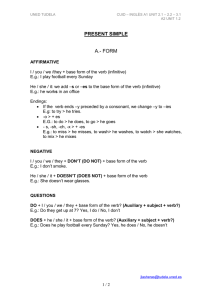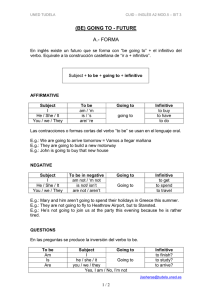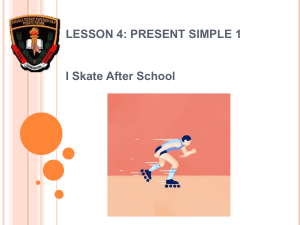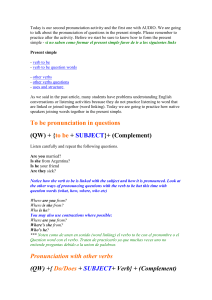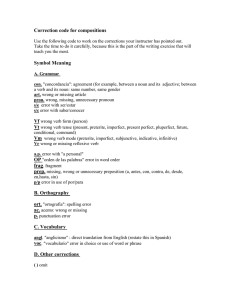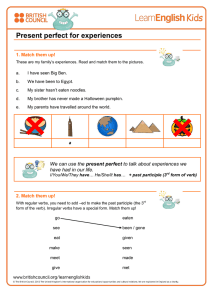PRESENT SIMPLE A.
Anuncio
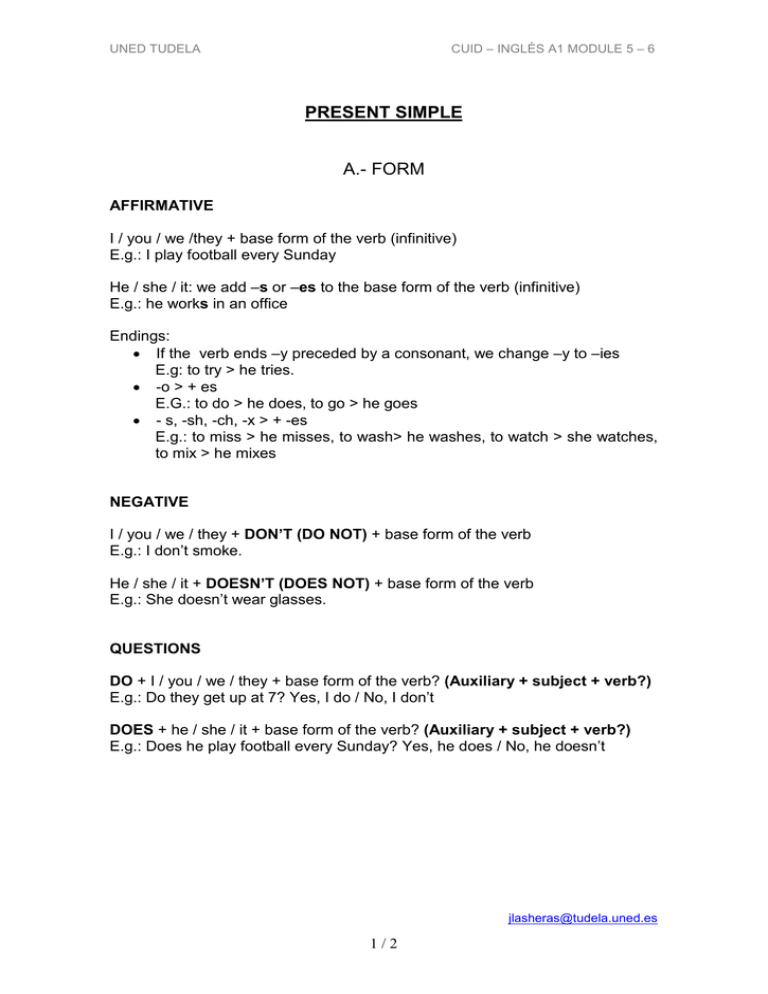
UNED TUDELA CUID – INGLÉS A1 MODULE 5 – 6 PRESENT SIMPLE A.- FORM AFFIRMATIVE I / you / we /they + base form of the verb (infinitive) E.g.: I play football every Sunday He / she / it: we add –s or –es to the base form of the verb (infinitive) E.g.: he works in an office Endings: • If the verb ends –y preceded by a consonant, we change –y to –ies E.g: to try > he tries. • -o > + es E.G.: to do > he does, to go > he goes • - s, -sh, -ch, -x > + -es E.g.: to miss > he misses, to wash> he washes, to watch > she watches, to mix > he mixes NEGATIVE I / you / we / they + DON’T (DO NOT) + base form of the verb E.g.: I don’t smoke. He / she / it + DOESN’T (DOES NOT) + base form of the verb E.g.: She doesn’t wear glasses. QUESTIONS DO + I / you / we / they + base form of the verb? (Auxiliary + subject + verb?) E.g.: Do they get up at 7? Yes, I do / No, I don’t DOES + he / she / it + base form of the verb? (Auxiliary + subject + verb?) E.g.: Does he play football every Sunday? Yes, he does / No, he doesn’t jlasheras@tudela.uned.es 1/2 UNED TUDELA CUID – INGLÉS A1 MODULE 5 – 6 B.- USE • Regular habits and daily routines (costumbres regulares y rutinas diarias) E.g.: She doesn’t often go to the cinema. When do they usually have lunch? • Facts or permanent truths. (Hechos o verdades permanentes) E.g.: Summer follows spring The Earth revolves around the Sun • Timetables and schedules (horarios y calendarios) E.g.. The train leaves in an hour. The plane doesn’t arrive until 10.35. • Stative verbs. Feelings (to love, to hate, to want, etc) opinions and states of mind (to think, to agree, to like, to understand, to believe, to know, etc), senses (to see, to hear, to smell, to taste and to touch) and verbs of possession (to have, to own, to belong) E.g.. She knows a lot of astrology I like playing football I can smell something burning He owns a Rolls Royce I hate getting up in the morning. Stative Verbs. Verbos que expresan sentimientos (to love, to hate, to want, etc), opiniones y estados de mente (to think, to agree, to like, to understand, to believe, to know, etc), de los sentidos (to see, to hear, to smell, to taste and to touch) y verbos de posesión (to have, to belong, to belong to) van siempre en Present Simple y no pueden ir en las formas continuas (Present Continuous, Past Continuous, etc). • Frequency adverbs (always, often, sometimes, rarely, seldom, usually, generally, occasionally, neverE) go BEFORE the main verb but AFTER the verb to be. E.g.: He always walks to work I am never late for school. Los adverbios de frecuencia (always, often, sometimes, rarely, seldom, usually, generally, occasionally, never, etc) se colocan ANTES del verbo principal pero DESPUES del verbo to be. jlasheras@tudela.uned.es 2/2
